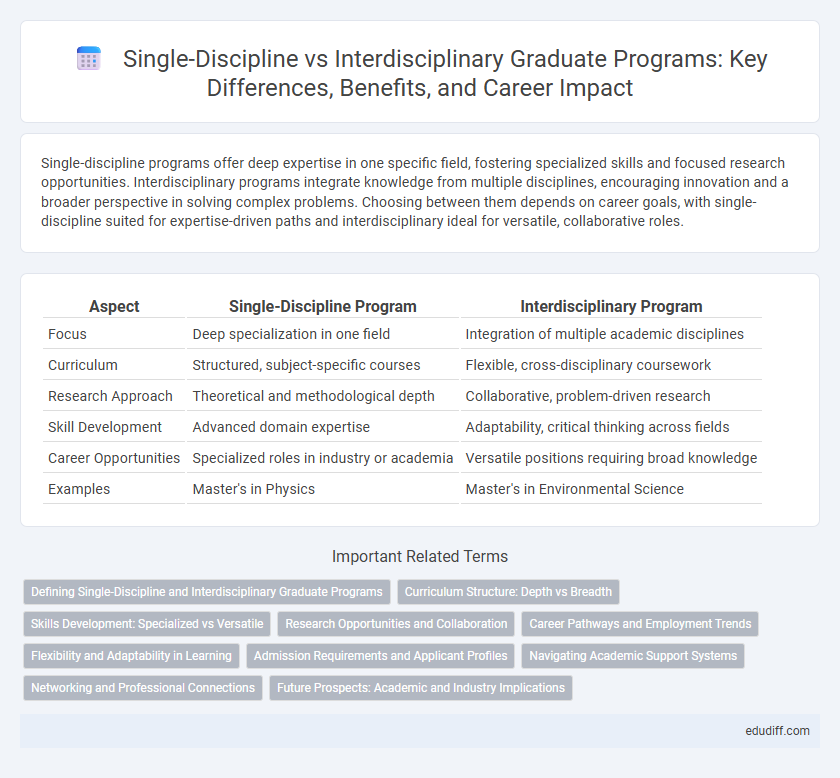Single-discipline programs offer deep expertise in one specific field, fostering specialized skills and focused research opportunities. Interdisciplinary programs integrate knowledge from multiple disciplines, encouraging innovation and a broader perspective in solving complex problems. Choosing between them depends on career goals, with single-discipline suited for expertise-driven paths and interdisciplinary ideal for versatile, collaborative roles.
Table of Comparison
| Aspect | Single-Discipline Program | Interdisciplinary Program |
|---|---|---|
| Focus | Deep specialization in one field | Integration of multiple academic disciplines |
| Curriculum | Structured, subject-specific courses | Flexible, cross-disciplinary coursework |
| Research Approach | Theoretical and methodological depth | Collaborative, problem-driven research |
| Skill Development | Advanced domain expertise | Adaptability, critical thinking across fields |
| Career Opportunities | Specialized roles in industry or academia | Versatile positions requiring broad knowledge |
| Examples | Master's in Physics | Master's in Environmental Science |
Defining Single-Discipline and Interdisciplinary Graduate Programs
Single-discipline graduate programs concentrate on mastering a specific field of study, offering deep, specialized knowledge and skills within one academic discipline such as biology, engineering, or history. Interdisciplinary graduate programs integrate methodologies, theories, and perspectives from multiple disciplines to address complex problems that cannot be solved through a single field alone, such as environmental science or cognitive science. These programs promote cross-disciplinary collaboration and innovation by combining expertise from diverse academic areas.
Curriculum Structure: Depth vs Breadth
Single-discipline graduate programs emphasize depth by offering specialized coursework and research opportunities within a specific field, allowing students to develop expert knowledge and technical skills. Interdisciplinary programs prioritize breadth, integrating concepts and methods from multiple disciplines to foster holistic understanding and innovative problem-solving abilities. Curriculum structure in single-discipline programs typically features sequential, focused modules, whereas interdisciplinary programs present a diverse array of subjects designed to promote cross-disciplinary collaboration and adaptability.
Skills Development: Specialized vs Versatile
Single-discipline graduate programs cultivate specialized skills by providing in-depth knowledge and expertise in a specific field, fostering mastery and technical proficiency. Interdisciplinary programs emphasize versatile skills through integrating multiple disciplines, enhancing adaptability, critical thinking, and problem-solving across diverse contexts. Graduates from interdisciplinary studies often excel in collaborative environments and complex real-world challenges, while single-discipline graduates demonstrate focused expertise valuable for highly specialized careers.
Research Opportunities and Collaboration
Single-discipline graduate programs offer deep expertise and focused research opportunities within a specific field, allowing students to develop specialized skills and contribute to advancing knowledge in a well-defined area. Interdisciplinary graduate programs facilitate collaboration across multiple fields, enabling students to address complex research questions by integrating diverse methodologies and perspectives. These programs enhance innovation and adaptability by fostering partnerships with faculty and peers from varied disciplines, broadening the scope and impact of research projects.
Career Pathways and Employment Trends
Single-discipline graduate programs offer deep expertise in a specific field, aligning with career pathways that demand specialized skills and knowledge, such as engineering or clinical psychology. Interdisciplinary programs, which integrate methods and insights from multiple fields, cater to emerging employment trends in innovative sectors like environmental sustainability, data science, and public health, where versatile problem-solving abilities are valued. Employment data indicates that graduates of interdisciplinary programs often experience broader career opportunities and adaptability in dynamic job markets compared to those from single-discipline tracks.
Flexibility and Adaptability in Learning
Single-discipline graduate programs offer focused expertise and deep knowledge in a specific field, fostering specialized skills critical for niche careers. Interdisciplinary programs promote flexibility by integrating diverse academic perspectives, enhancing adaptability to complex, evolving industries and research areas. Students in interdisciplinary tracks develop versatile problem-solving abilities, preparing them to navigate and innovate within multifaceted professional environments.
Admission Requirements and Applicant Profiles
Single-discipline graduate programs typically require applicants to demonstrate in-depth knowledge and proven academic excellence in a specific field, often necessitating prerequisite coursework and specialized entrance exams. Interdisciplinary programs prioritize candidates with diverse academic backgrounds, emphasizing adaptability, collaborative skills, and the ability to integrate multiple disciplines, often seeking evidence of cross-field research or experience. Admission requirements for interdisciplinary programs may include broader academic transcripts and portfolios reflecting interdisciplinary interest, contrasting with the narrowly focused criteria of single-discipline admissions.
Navigating Academic Support Systems
Graduate students in single-discipline programs often rely on specialized academic support services tailored to their specific field, such as dedicated faculty advisors and discipline-focused research resources. Interdisciplinary programs require access to a broader range of support, including cross-departmental mentoring and integrated resource networks that address multiple academic domains. Effective navigation of academic support systems in either program type enhances research outcomes and professional development by connecting students with relevant expertise and collaborative opportunities.
Networking and Professional Connections
Graduate programs with a single-discipline focus often provide deep expertise and strong professional networks within a specific field, enhancing targeted career opportunities. Interdisciplinary programs encourage collaboration across multiple fields, fostering diverse networking connections that can lead to innovative career paths and broader industry exposure. Building professional connections in interdisciplinary programs often involves engaging with varied academic communities and industry sectors, which can expand career flexibility and resilience.
Future Prospects: Academic and Industry Implications
Single-discipline graduate programs offer deep expertise and specialization that align closely with traditional academic research roles and specific industry sectors seeking focused skill sets. Interdisciplinary programs cultivate versatile problem-solving abilities and adaptability, fostering innovation in emerging fields like data science, environmental studies, and healthcare technology, which increasingly demand cross-sector collaboration. Graduates from interdisciplinary programs often experience broader career opportunities and leadership positions due to their integrated knowledge and ability to navigate complex, multifaceted challenges in both academia and industry.
Single-discipline Program vs Interdisciplinary Program Infographic

 edudiff.com
edudiff.com